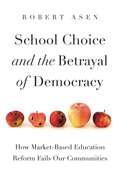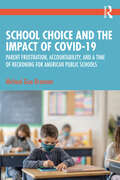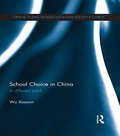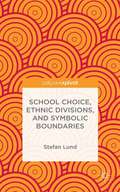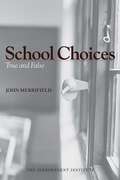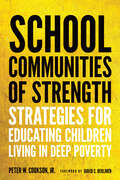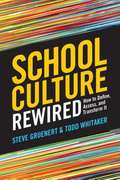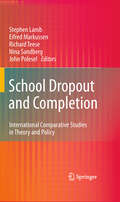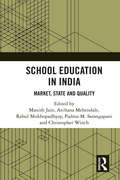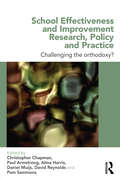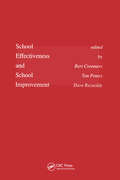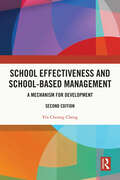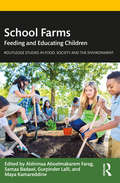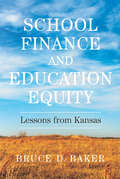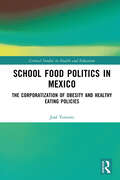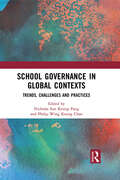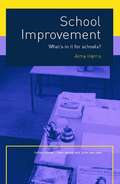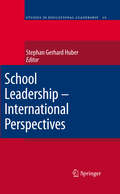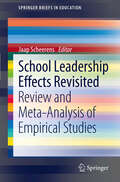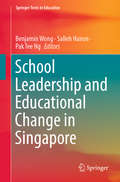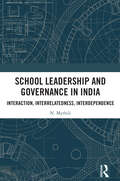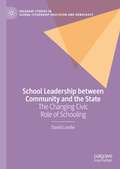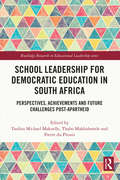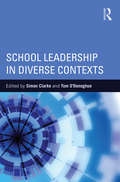- Table View
- List View
School Choice and the Betrayal of Democracy: How Market-Based Education Reform Fails Our Communities (Rhetoric and Democratic Deliberation #26)
by Robert AsenEvidence shows that the increasing privatization of K–12 education siphons resources away from public schools, resulting in poorer learning conditions, underpaid teachers, and greater inequality. But, as Robert Asen reveals here, the damage that market-based education reform inflicts on society runs much deeper. At their core, these efforts are antidemocratic.Arguing that democratic communities and public education need one another, Asen examines the theory driving privatization, popularized in the neoliberalism of Milton and Rose Friedman, as well as the case for school choice promoted by former secretary of education Betsy DeVos and the controversial voucher program of former Wisconsin governor Scott Walker. What Asen finds is that a market-based approach holds not just a different view of distributing education but a different vision of society. When the values of the market—choice, competition, and self-interest—shape national education, that policy produces individuals, Asen contends, with no connections to community and no obligations to one another. The result is a society at odds with democracy.Probing and thought-provoking, School Choice and the Betrayal of Democracy features interviews with local, on-the-ground advocates for public education and offers a countering vision of democratic education—one oriented toward civic relationships, community, and equality. This book is essential reading for policymakers, advocates of public education, citizens, and researchers.
School Choice and the Betrayal of Democracy: How Market-Based Education Reform Fails Our Communities (Rhetoric and Democratic Deliberation)
by Robert AsenEvidence shows that the increasing privatization of K–12 education siphons resources away from public schools, resulting in poorer learning conditions, underpaid teachers, and greater inequality. But, as Robert Asen reveals here, the damage that market-based education reform inflicts on society runs much deeper. At their core, these efforts are antidemocratic.Arguing that democratic communities and public education need one another, Asen examines the theory driving privatization, popularized in the neoliberalism of Milton and Rose Friedman, as well as the case for school choice promoted by former secretary of education Betsy DeVos and the controversial voucher program of former Wisconsin governor Scott Walker. What Asen finds is that a market-based approach holds not just a different view of distributing education but a different vision of society. When the values of the market—choice, competition, and self-interest—shape national education, that policy produces individuals, Asen contends, with no connections to community and no obligations to one another. The result is a society at odds with democracy.Probing and thought-provoking, School Choice and the Betrayal of Democracy features interviews with local, on-the-ground advocates for public education and offers a countering vision of democratic education—one oriented toward civic relationships, community, and equality. This book is essential reading for policymakers, advocates of public education, citizens, and researchers.
School Choice and the Impact of COVID-19: Parent Frustration, Accountability, and a Time of Reckoning For American Public Schools
by Michael Guo-BrennanThrough the broad lens of political economy and centred around education reform policy, this essential book provides an in-depth analysis of the current state of American public education and the impact of Covid-19 on calls for change. Drawing upon evidence from nations that routinely outperform America, this text proposes a more holistic approach to accountability and improvement within the American public education system. Chapters explore the issues faced by the current American public education system and proposes potential solutions, including: the role of government as provider of education services; liberty, democracy, and freedom and the ability of parents to control their child’s education; growing frustration with schools, public policies surrounding Covid and other potential crises; and how these concerns will impact the school choice movement. This is an important read for researchers and postgraduate students in education, teachers, parents, public policy makers and appointed government officials who wish to improve the quality of public education. Whether for or against school choice, this book will leave you better informed on current issues of American public education.
School Choice in China: A different tale? (Education and Society in China)
by Wu XiaoxinSchool Choice in China explores the major characteristics of schooling options in China, highlighting how largely middle-class parents exploit their cultural, economic and social capital for their children's admission into choice schools. It highlights how payments such as choice fees, donations, prize-winning certificates and awards, as well as the use of guanxi, result in Chinese school choice as a parent-driven, bottom-up movement. The author also explores how schools and local governments cash in on the school choice fever in order to obtain significant economic returns, leading to policies that accommodate the needs of mostly middle-class families. He argues that although this system seems to create winners among the parties involved, it exacerbates the educational inequality that already exists in Chinese society. Chapters include: Positional competition for cultural capital Exploitation of social capital Economics of school choice Class reproduction through parental choice This book is not simply a detailed analysis of Chinese school choice practices, but also a study of the competitive middle class search for advantage for their children. As such it will be beneficial to undergraduates, postgraduates, education professionals, policy makers, and anyone with an interest in education, sociology, social policy, and the rise and future of China.
School Choice, Ethnic Divisions, and Symbolic Boundaries
by Stefan LundThis book enriches empirical and theoretical understandings of how school choice and school segregation are generated by the construction and negotiation of ethnic divisions by placing emphasis on feelings of belonging and we-ness as important structuring forces that guide and restrict students' school choices.
School Choices: True and False
by John MerrifieldThe school choice movement has gained political momentum in recent years, with programs having been established in Milwaukee, Florida, Texas, and elsewhere. But today&’s programs are nothing like the "free market in education" proposed four decades ago by the early proponents of school choice.Economist John Merrifield shows that the "school choice" movement has become mired in false alternatives, petty distinctions, and diminished vision. Yet, he argues that programs providing real educational choices must not be allowed to fail like so many government programs—a freely competitive market for education must remain the ultimate goal. School Choices: True and False charts a course for the achievement of this goal.
School Communities of Strength: Strategies for Educating Children Living in Deep Poverty
by Peter W. Cookson Jr.An evidence-based plan of action to achieve educational justice for K–12 public school students from families whose income is 50% or more below the US poverty threshold
School Culture Rewired: How to Define, Asses, and Transform It
by Todd Whitaker Steve GruenertYour school is a lot more than a center of student learning--it also represents a self-contained culture, with traditions and expectations that reflect its unique mission and demographics. In this groundbreaking book, education experts Steve Gruenert and Todd Whitaker offer tools, strategies, and advice for defining, assessing, and ultimately transforming your school's culture into one that is positive, forward-looking, and actively working to enrich students lives. Drawing from decades of research on organizational cultures and school leadership, the authors provide everything you need to optimize both the culture and climate of your school, including: <p><p> - "Culture-busting" strategies to help teachers adopt positive attitudes, outlooks, and behaviors; <p> - A framework for pinpointing the type of culture you have, the type that you want, and the actions you need to take to bridge the two; <p> - Tips for hiring, training, and retaining teachers who will actively work to improve your school's culture; and <p> - Instructions on how to create and implement a successful School Culture Rewiring Team. <p> Though often invisible to the naked eye, a school's culture influences everything that takes place under its roof. Whether your school is urban or rural, prosperous or struggling, School Culture Rewired is the ultimate guide to making sure that the culture in your school is guided first and foremost by what's best for your students.
School Dropout and Completion
by Stephen Lamb Richard Teese John Polesel Eifred Markussen Nina SandbergSchool dropout remains a persistent and critical issue in many school systems, so much so that it is sometimes referred to as a crisis. Populations across the globe have come to depend on success at school for establishing careers and gaining access to post-school qualifications. Yet large numbers of young people are excluded from the advantages that successful completion of school brings and as a result are subjected to consequences such as higher likelihood of unemployment, lower earnings, greater dependence on welfare and poorer physical health and well-being. Over recent decades, most western nations have stepped up their efforts to reduce drop out and raise school completion rates while maintaining high standards. How school systems have approached this, and how successful they are, varies. This book compares the various approaches by evaluating their impact on rates of dropout and completion. Case studies of national systems are used to highlight the different approaches including institutional arrangements and the various alternative secondary school programs and their outcomes. The evaluation is based on several key questions: What are the main approaches? How do they work? For whom do they work? And, how successful are they in promoting high rates of completion and equivalent outcomes for all? This book examines the nature of the dropout problem in advanced industrialized countries with the goal of developing a broader, international understanding that can feed into public policy to help improve completion rates worldwide.
School Education in India: Market, State and Quality
by Christopher Winch Manish Jain Archana Mehendale Rahul Mukhopadhyay Padma M. SarangapaniThis volume examines how the public and private domains in school education in India are informed and mediated by current market realities. It moves beyond the simplistic dichotomy of pro-state versus promarket factors that define most current debates in the formulations of educational reform agendas to underline how they need to be interpreted in the larger context. The chapters in the volume present a series of conceptual and empirical investigations to understand the growth of private schools in India; investigate the largely uncontested claims made by the private sector regarding provision of superior quality of education; and their ability to address the educational needs of the poor. Further, the book looks at how the private–public dichotomy has been extended to professional identity of teachers and teaching practices as well. <P><P>Rich in primary data and supported by detailed case studies, this volume will be of interest to teachers, scholars and researchers dealing with education, educational policy, school education and public policy. It will also interest policy makers, think tanks and civil society organisations.
School Effectiveness and Improvement Research, Policy and Practice: Challenging the Orthodoxy?
by David Reynolds Daniel Muijs Alma Harris Paul Armstrong Christopher Chapman Pam SammonsThis book provides a contemporary overview of school effectiveness and improvement. It charts the development theory and research in this area and looks at the contribution made to policy and practice. It also challenges some assumptions that have become ingrained into the theoretical and methodological traditions of the field. By challenging these orthodoxies, it provides a framework that sets a new agenda and repositions the field to meet the emerging challenges of the twenty-first century. It argues that traditional measures of school effectiveness are challenged as systems have attempted to adapt to a complex range of emerging agendas. New theoretical perspectives are required which consider 'education' and a 'broader set of outcomes'. This shift requires a rethink of how effectiveness and improvement have been understood by the field, and a reconstruction by policy makers and practitioners. Attention must be given to promoting equity as well as effectiveness so that one school or student's gain no longer means another's loss. The field must develop new methodologies if inequities are to be challenged and a broader set of outcome measures are to be developed. The two questions guiding this book are: How can educational effectiveness and improvement research and practice support the development of a more equitable education service? What are the key indicators of educational effectiveness and improvement and what are the new methodologies required to facilitate a shift from 'school' effectiveness and improvement to 'educational' effectiveness and improvement? This book uses lenses of research, policy and practice to explore these key questions and articulate what such a repositioning may look like and how it may be achieved. It will prove invaluable for teachers, school leaders and anyone involved in policy and educational research.
School Effectiveness and School Improvement
by Bert Creemers Ton Peters Dave ReynoldsSchool effectiveness and school improvement have different origins: School effectiveness is more directed to finding out "what works" in education and "why"; school improvement is practice and policy oriented and intended to change education in the desired direction. However, in their orientation to outcomes, input, processes, and context in education, they also have much in common. In the theoretical part, different orientations have been analysed and combined in a model for effective school improvement. Based on this analysis, an evaluation framework was developed for the analysis of the case studies of school improvement projects in the participating countries. The theoretical model and the results of the analyses of the case studies were combined in a framework of effective school improvement.
School Effectiveness and School-Based Management: A Mechanism for Development
by Yin Cheong ChengThis new edition of an internationally renowned classic book provides a new comprehensive framework of latest perspectives and findings, fills gaps in the ongoing research, policy and practice, and re-engineers a school-based mechanism for understanding and managing school-based development initiatives. The book addresses the burning issues about how school-based management (SBM) and school effectiveness should be related to the new paradigm in education and the third wave of education reforms worldwide. The book includes four parts and 12 chapters covering (1) School Effectiveness (i.e., multiple school functions, models of effectiveness and pursuit of dynamic effectiveness); (2) SBM (i.e., theories of SBM, multi-level self-management (SM), and its implementation); (3) Leadership for Change (i.e., leadership for SBM, staff development, school-based change, and curriculum change); and (4) Future Developments (i.e., an SBM mechanism for effectiveness and paradigm shift towards the third wave). The framework and related analysis will benefit the understanding, policy formulation, school practice and research of the key stakeholders including policy makers, educators, change agents, researchers and those concerned in facing the challenges from the ongoing education reforms in different parts of the world.
School Farms: Feeding and Educating Children (Routledge Studies in Food, Society and the Environment)
by Alshimaa Aboelmakarem Farag, Samaa Badawi, Gurpinder Lalli, and Maya KamareddineThis book highlights the potential of school farms to fight hunger and malnutrition by providing access to locally produced, fresh, and healthy food as well as providing young students with educational opportunities to learn, interact with nature, and develop their skills. Hunger is one of the most pressing concerns we face today and there is a clear need to provide alternative sources of food to feed a fast-growing population. School farms offer a sustainable opportunity to produce food locally in order to feed underprivileged students who rely on school meals as an integral part of their daily diet. Approaching the concept of school farms through four themes, Problem, People, Process, and Place, the book shows how they can play an essential role in providing sustainable and healthy food for students, the critical role educational institutions can play in promoting this process, and the positive impact hands-on farming can have on students' mental and physical wellbeing. Utilizing the authors' personal hands-on experiences, and drawing on global case studies, the book provides a theoretical framework and practical guidance to help with the establishment of school farms and community-based gardening projects and an education system which promotes a sustainable and healthy approach to food, agriculture, and the environment. This book will be essential reading for students and scholars of food security, agriculture, healthy and sustainable diets, education for sustainable development, and urban studies. It will also be of great interest to practitioners and policymakers involved in food policy, developing school and community projects, global health and international development, as well as education professionals.
School Finance and Education Equity: Lessons from Kansas
by Bruce D. BakerThis inspiring account of bipartisan political success delivers an expert breakdown of how and why Kansas—a politically conservative state—was able to craft a stable, balanced, and equitable system of funding for its public schools. Beyond a chronicle of one state&’s achievements, School Finance and Education Equity provides invaluable policy guidance and lays out a blueprint that other states can use to strengthen their own public education systems.Readers are given an insider&’s tour of the Kansas story by Bruce D. Baker, an academic researcher and expert witness in school finance litigation. With more than two decades of involvement with the state, Baker combines historical background, legal analysis, and political and economic contextual data—along with a gleaming wit—to present a thorough, enlightening narrative of Kansas&’s K–12 funding journey.As Baker points out, other states can find much to learn here. He shows that, when it comes to school finance, Kansas serves as an exemplar in aligning resources to meet the promises of its constitution. State leaders rejected the pervasive notion that money doesn&’t matter in education, and they gathered the data to prove that it does. Baker emphasizes that this kind of slow and steady success hinges on the ability of stakeholders to remain involved over time. Continuity is vitally important.Baker&’s account highlights how persistence can overcome opposition, continuity can aid reform, and incremental gains can lead to big change. In an era of national ideological polarization and political and economic volatility, the lessons from Kansas are especially illuminating.
School Food Politics in Mexico: The Corporatization of Obesity and Healthy Eating Policies (Critical Studies in Health and Education)
by José TenorioIntertwining policy analysis and ethnography, José Tenorio examines how, and why now, the promotion of healthy lifestyles has been positioned as an ideal ‘solution’ to obesity and how this shapes the preparation, sale and consumption of food in schools in Mexico. This book situates obesity as a structural problem enabled by market-driven policy change, problematizing the focus on individual behavior change which underpins current obesity policy. It argues that the idea of healthy lifestyles draws attention away from the economic and political roots of obesity, shifting blame onto an ‘uneducated’ population. Deploying Foucault’s concept of dispositif, Tenorio argues that healthy lifestyles functions as an ensemble of mechanisms to deploy representations of reality, spaces, institutions and subjectivities aligned with market principles, constructing individuals both as culprits for what they eat and the prime locus of policy intervention to change diets. He demonstrates how this ensemble enmeshes within the local cultural and economic conditions surrounding the provisioning of food in Mexican schools, and how it is contested in the practices around cooking. Expanding the conversation on the politics of food in schools, obesity policy and dominant perspectives on the relation between food and health, this book is a must-read for scholars of food and nutrition, public health and education, as well as those with an interest in development studies and policy enactment and outcomes.
School Governance in Global Contexts: Trends, Challenges and Practices
by Nicholas Sun Keung PangThe edited volume provides multiple lens to view school governance practices, exploring its modernization, ethical review, future trend, as well as the reciprocal influence of educational policy. Drawing on a wide-spread experience in the field of education governance from leading scholars, emerging scholars, doctoral research students and school principals, this book includes insights from 11 countries and economies across four continents: Asia, Europe, North America and Oceanic. Most of them are high achievers in the OECD’s PISA 2018 worldwide ranking in mathematics, science and reading. The book not only lifts to the forefront school governance educational thinking, but also acknowledges their complex evolution, especially under the current impact of COVID-19 Pandemic. This book will be of interest to academics, professionals and policymakers in education and school governance, and any scholars who engage in historical studies of education and debates about educational governance.
School Improvement: What's In It For Schools? (What's in it for schools?)
by Alma HarrisThis book aims to demystify the principles and practice of school improvement by demonstrating how successful classroom and school improvement occurs. It outlines the conditions, strategies and approaches that promote sustainable improvement and provides an overview of the main theoretical perspectives in this area. This accessible text will be useful for practitioners working within schools and with schools, offering clear guidance for those keen to raise standards and improve achievement. The What's In It For Schools? series aims to make educational policy issues relevant to practitioners. Each book in the series focuses on a major educational issue. The author sets the issue in context, looks at how it impacts on the daily lives of schools and teachers, and raises key questions. The books are grounded in sound theory, recent research evidence and best practice, and will make an excellent addition to any staffroom bookshelf.
School Leadership - International Perspectives
by Stephan HuberRecent research into school effectiveness has corroborated the theory that the school leader plays a pivotal role making their school a successful institution, and is most often cited as the key factor in a school's development. Reflecting the importance it is given in the today's education landscape, this book explores the latest trends in school leadership from both theoretical and practical perspectives. Each chapter provides insight into an aspect of current research, with detailed case studies coming from as far afield as Hong Kong and Canada. In the context of the ever-increasing burden of responsibility placed on education management to safeguard and enhance the quality of education they provide, school leadership is now a core concern of policy makers. In addition, most countries are undertaking fundamental education reforms that will have a major influence on the nature of school leadership. Offering the most up-to-date research on this central issue, this book will both inform and shape the debate.
School Leadership Effects Revisited
by Jaap ScheerensThis highly detailed study maps four decades of evolution of the concept of what constitutes effective school leadership. It analyses the theoretical background to these developments and advocates the utility of thinking of a 'lean' form of school leadership that is comparable to the concept of 'meta-control'. A wide-ranging survey of the empirical research literature on leadership effects includes the presentation of results from earlier meta-analyses as well as a new meta-analysis on some 25 studies carried out between 2005 and 2010. This survey demonstrates that older reviews and meta-analyses were predominantly based on so-called 'direct effect' studies, while more recent studies have tried to quantify the indirect effects of leadership, mediated by other school variables. While acknowledging the relatively small total effect of leadership on student outcomes, the study does identify promising intermediary factors which, stimulated by specific leadership behaviours, impact on student performance. The book ends by drawing out wider implications for educational practice and policy, presented under headings such as 'schools need leadership', 'the toolkit of the school leader as a meta-controller', 'the special case of turning around failing schools' and 'efficiency of school leadership'. In passing, the authors make several suggestions about potentially fruitful next steps in researching the effects of school leadership.
School Leadership and Educational Change in Singapore (Springer Texts in Education)
by Benjamin Wong Pak Tee Ng Salleh HaironThis book provides readers with insights into how Singapore school leaders are actively engaged in the transformation of the Singapore education system. It brings to attention crucial elucidations of the increasing demand and complexity placed on school leaders through the use of case studies. Each chapter in the book focuses on a particular issue which has become important or has gained renewed importance in the Singapore education system. The chapters first provide a background to the theme under examination and a theoretical basis for discussion. They then narrate the case that shows how school leaders interpret and implement policy initiatives in their respective schools or lead change in that area. The case studies span over a wide range of domains such as instructional leadership, assessment leadership, stakeholder engagement, professional learning communities, and school branding. The data collected from these case studies came primarily from interviews of educators in their respective school contexts, in addition to other sources of data such as artifacts. Each case study highlights descriptions, interpretations, and perspectives across school contexts, which is consistent with the proposition that school leadership is very much shaped by context. At the end of each chapter, there are guiding questions to help readers critically analyse and reflect on the main learning points of the case.
School Leadership and Governance in India: Interaction, Interrelatedness, Interdependence
by N. MythiliThis book explores school processes that shape student learning and principals’ leadership. It uses an interdisciplinary approach by applying the complexity governance and leadership theories drawn from public administration and leadership discourse in education. The strength of this book lies in identifying the latent processes that determine governance and leadership using interaction, inter-relatedness and interdependence through explanation building used in advanced qualitative analysis which hitherto rarely used in education. For this purpose, it first draws organised data developed as leadership function-behaviour interaction in the book School leadership in India: Styles, functions, behaviours and practices written by the same author and published by Routledge in 2025. Another important feature of the volume is how it applies robust theories drawing from public administration and educational leadership using an interdisciplinary approach that was rare to find in studying school governance and leadership.This book will be of interest to researchers, academicians working in the area of educational leadership and management, school and teacher education in universities, research institutes, think-tanks working on education policy, good governance and public policy in general. It is also relevant in management institutes, public administration, development studies and public policy in universities.
School Leadership between Community and the State: The Changing Civic Role of Schooling (Palgrave Studies in Global Citizenship Education and Democracy)
by David LundieThis book presents changes in UK and global educational governance in the context of a radical shift in the operating logics of politics and its interaction with education. Beginning from the colonial origins of political interest in education, the author traces a fundamental shift in the patterns of governance of schools in England in the opening decades of the 21st century. Operating through the logics of public choice economics involving both real markets and quasi-markets, policy reforms have increasingly framed school values, and the value of schooling, in line with a politically determined and nostalgic discourse of ‘British values’. This stands in contrast to a previous focus on ‘community cohesion’ which foregrounded school partnership with the parent community and wider society. Tracing the processes and mid-level actors mediating between government and school leaders, the author identifies processes of recontextualisation through which policy can be reinscribed and resisted.
School Leadership for Democratic Education in South Africa: Perspectives, Achievements and Future Challenges Post-Apartheid (Routledge Research in Educational Leadership)
by Tsediso Michael Makoelle Thabo Makhalemele Pierre Du PlessisSchool Leadership for Democratic Education in South Africa explores the democratization and modernization of education in South Africa, analyzing the state of school leadership in South African schools from the time of the new democratic education dispensation in 1994 to the present day. The book maps out what the future of education in South Africa could look like and explores the most conducive educational environments for change in South African schools. It adopts a critical approach to analyzing leadership and management in the context of school governance, school effectiveness, teacher development, multiculturalism and equity in education. Contributions explore the democratization and modernization of education in South Africa through examining different perspectives, achievements and challenges, and also consider issues around access to technology, language policy and the curriculum along with new literature on selected aspects of leadership. This book will be of great interest for researchers, scholars, and students in the fields of educational leadership, sociology of education, and teacher education.
School Leadership in Diverse Contexts
by Simon Clarke Tom O'DonoghueSchool Leadership in Diverse Contexts demonstrates the centrality of context to understanding school leadership. It offers varied portrayals of leadership in a diverse range of distinct settings. Each chapter highlights the prominence of context in understanding the realities of school leadership, focusing on issues and influences that school leaders face, strategies school leaders adopt to deal with the complexities of their work, and conceptualisations of school leadership relevant to the context. An impressive array of international experts examine this neglected area of research by considering school leadership in nine heterogeneous contexts, providing rich and varied portrayals of school leadership and suggesting ways in which the leadership may be enhanced. School Leadership in Diverse Contexts is an ideal book for undergraduate and postgraduate students, particularly those studying units in educational leadership, comparative education and educational policy. Similarly undergraduate and postgraduate students engaged with development studies, history, sociology, law, human geography will be attracted to this text.
